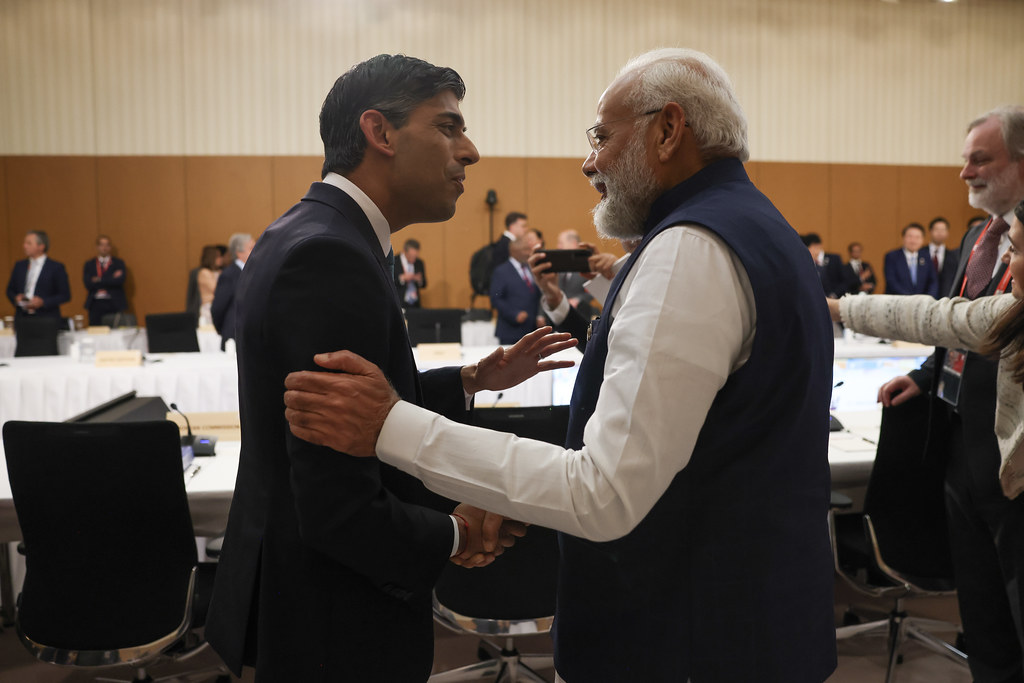The issue of inking a Free Trade Agreement (FTA) between India and the UK has been under bilateral discussion for a long time. Experts have been discussing its complexities. Each side wants the deal to be just and equitable and serve the interests of their people.
A team of negotiators led by a senior British civil servant flew out on Monday with a mandate to resolve the goods and services chapters, which are among the thorniest outstanding issues in the talks.
The Conservatives share the impression that the Modi administration intends to hold out the deal for the Labour government, hence the urgency of clinching the deal now. This impression also conveys that the Conservatives feel Modi’s return to power in the 2024 parliamentary elections in India is a foregone conclusion.
Two former Prime Ministers, Boris Johnson and Liz Truss had also sought to secure a multibillion-pound free-trade agreement (FTA) with India, a booming economy of 1.4 billion people. If the deal matures, it will be seen as one of the biggest Brexit prizes.
UK negotiators have reportedly been told that India expects more favorable terms regarding visas and a social security agreement under a Labour government. This sentiment stems from Labour Party’s shadow business secretary Jonathan Reynolds’ recent visit to India, where he met with trade minister Piyush Goyal in Delhi.
The shadow business secretary met Goyal during a trip to Delhi last month. His visit rankled with government figures who are concerned that India may decide to hold out until after the UK general election in the hopes of getting a better deal from Keir Starmer’s government. Labour is projected to win a majority in the forthcoming elections in the UK.
India’s Focus
Both sides want maximum benefits for their people and that remains their focal point in the course of protracted negotiations. India is negotiating for greater mobility for its skilled professionals in sectors like IT and healthcare, besides market access for several goods at nil customs duty.
The UK is seeking major cuts in import duties on goods, such as scotch whiskey, electric vehicles, lamb meat, chocolates, and certain confectionery items. The UK has also sought access to India’s government procurement, including for centrally funded projects within states.
India’s trade negotiators are wary of giving too many concessions or widening domestic market access, as the UK FTA model could then get replicated in EU and EFTA agreements.
Visas and social security are among the most politically sensitive parts of the proposed deal. India wants to secure more visas for Indian workers and an agreement to claw back social security payments they make while working in the UK.
Visas are especially tricky for Rishi Sunak because Conservative MPs are deeply concerned about net migration into the UK, which hit a record high in 2022.
The UK-India negotiations have been in the final stages for weeks, and both sides are now privately warning that time is running out before India’s general election campaign begins.
India’s election is expected to take place in April or May. The electoral commission is expected to set an exact date in the next few weeks, and trade talks will be suspended once the campaign begins.
The India-UK FTA pact will be the most comprehensive trade agreement signed by India. Of the 26 chapters, 24 have reached in-principle agreement or broad consensus.

Present Status
According to reports in The Economic Times, areas that await final agreement include the rules of origin, where product-specific rules, value addition, a change in the chapter heading, and certification are being discussed.
India does not want the UK to be used to route goods to India as that inflates its import bills; the country’s trade deficit hit US$263 billion in FY 2022-23, up from US$191 billion in FY 2021-22.
On its part, UK negotiators want a more streamlined Customs bureaucracy. Under intellectual property, chapter considerations pending final consensus may be about 37 changes demanded by the UK’s life sciences and biotech sectors. India’s intellectual property rights are also being discussed.
India-UK bilateral trade increased to US$20.36 billion in 2022-23 from US$17.5 billion in 2021-22
Respective Views
A spokesperson for the Department of Business and Trade said: “We have always been clear we will only sign a deal that is fair, balanced, and ultimately in the best interests of the British people and the economy. The UK and India continue to work towards an ambitious trade deal that works for both countries.”
A Labour spokesperson said: “No negotiations have taken place between the Labour Party and the Indian government. If the UK government fails to deliver on another one of their promises, they have only themselves to blame. Labour will always value and seek to deepen the connections between our two great trading nations.
If the UK election happens this spring, the next few weeks may be Sunak’s last chance to finalize an agreement. But if, as expected, it happens in the autumn, there is a narrow window for a deal to be agreed over the summer.
- OPED By KN Pandita.
- Prof. Pandita (Padma Shri) is the former director of the Center of Central Asian Studies at Kashmir University. Views Personal Of The Author.
- Follow EurAsian Times on X (formerly Twitter)




